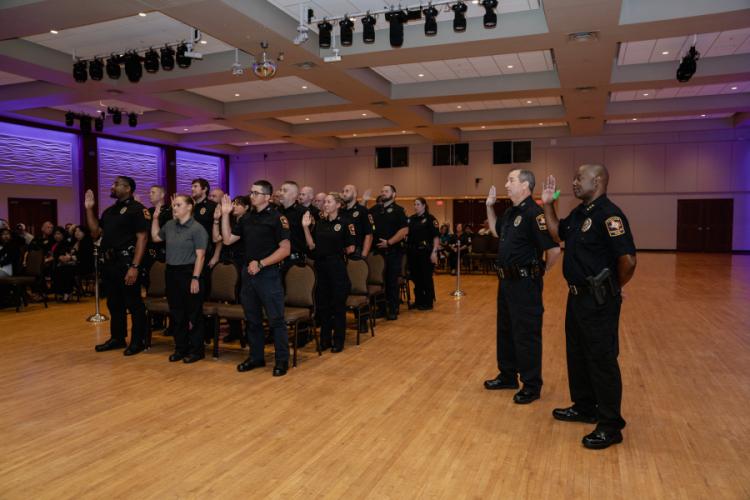NACOGDOCHES, Texas –– Officers of Stephen F. Austin State University’s police department received a dual commission with The University of Texas System’s police force during a ceremony Monday on the SFA campus.
The University Police Department officers became jointly commissioned as both SFA and UT System officers, which will hold until Sept. 1 when SFA officially becomes a member of the UT System. At that time, UPD officers will be commissioned only with the system, though their primary role will remain serving the SFA campus.
John Fields, SFA’s chief of police, said the department will continue to serve SFA and the campus community in the manner in which it has built its reputation — with professionalism and ethical decision-making.
Commissioning the officers into the UT System “will bring a sense of humanity to and a mutual respect with the campus community, which we see across the state already,” Michael J. Heidingsfield, UT System director of police, said during the Monday ceremony held in SFA’s Baker Pattillo Student Center Grand Ballroom. “SFA officers are motivated by the same things that motivate the UT System police across Texas, so I think we’ll see a very nice marriage of people.”
SFA will join the UT System officially on Sept. 1 following the signing of Senate Bill 1055 earlier this year by Gov. Greg Abbott.
Along with additional support resources, SFA’s University Police Department will have access to the system’s police academy that will be critical to develop new recruits and for veteran officers who need to continue a high level of training. The department will join a collective police force of over 600 sworn officers once affiliated.
Created in 1967, the UT System’s police force is the third largest law enforcement agency in Texas. Upon their official commission into the UT System police force on Sept. 1, SFA’s UPD officers will report to the system’s Office of the Director of Police, or ODOP.
According to UPD’s Chief of Police John Fields, who was chief of police at Albany State University during a similar affiliation with the University System of Georgia in 2016, the mission of UPD will remain the same: to provide a safe environment to the campus community, particularly its most important asset — the student body.
Fields also confirmed the department will maintain a direct contact approach, or an open-door policy, so students, faculty and staff can swiftly access the assistance they need. Additionally, all UPD-hosted events and trainings, such as the Citizens’ Police Academy, active shooter trainings and charitable initiatives like Shop with a Cop, will remain.
“I want to make sure everyone knows that our services are not going to change; it’s going to get better,” Fields said during the ceremony Monday.
Joining the UT System also will bring with it an update to UPD’s physical presence. Following the ceremony, UPD debuted police vehicles outfitted with decals emblazoned with both “Stephen F. Austin State University” and the UT System name. Current vehicles will gradually be phased out and replaced by the newly designed vehicles. SFA officers also were provided a new University of Texas System police patch during the ceremony, which will later be accompanied by system police uniforms.
“Stephen F. Austin State University will always be here,” Fields said. “You’ll see it on the vehicles as a reminder. I want people to understand that SFA’s police will continue to maintain SFA’s vision and culture.”
Fields, who has established a familial atmosphere within UPD while at the helm, expects the transition to the UT System to add to that atmosphere and, ultimately, add to the department’s success.
“It’s OK to be a team, but the important thing is treating the department like a family,” Fields said prior to the ceremony. “Sometimes, a team functions like a robot. But if you operate as a family, you will have better results. And now we’re joining a bigger family, which will lead to bigger results.”
 Axe ’Em, Jacks!
Axe ’Em, Jacks!
